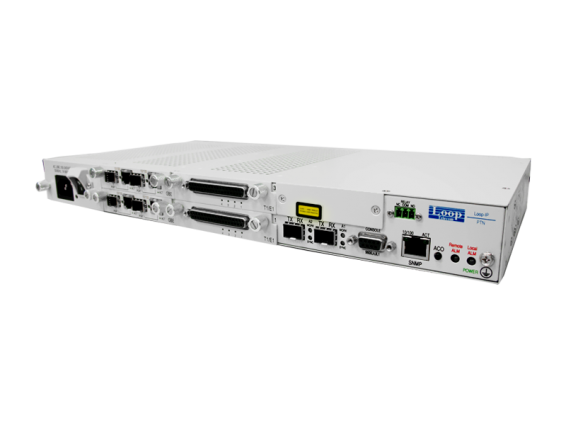In addition to working now, service providers also have to build the network to meet future requirements.
The IP6750 can handle temperature ranges of 0° to 65°C. It supports many protocols such as MEF-8 CESoETH, SyncE and IEEE1588v2 Precision Timing, G.8031 Ethernet Linear Protection Switching, and a RFC2544 built-in traffic generator.
The IP6750’s durability and capabilities make it an important device for your network to meet the requirements of a carrier-grade Service Level Agreement (SLA).
Mechanical and Electrical
- 1U height, 19” width ANSI/ETSI
- Power module
- AC/DC dual feed slots
- Hot swappable
- Temperature range from 0° to 65°C
WAN Aggregate Interface
- 2 GbE ports with SFP housing
- IEEE 802.3ad Ethernet Link Aggregation
- G.8032 v1/v2 – Ethernet Ring Protection Switching (ERPS)*
- G.8031 Ethernet Linear Protection Switching (ELPS)
- Compliant with MEF 8, 9 and 14
Timing
- Internal/Line
- External BITS I/O with RJ connector: 2 Mbps, 2 MHz, 1.544Mbps composite clock
- Adaptive Clock Recovery (ACR) and Differential Clock Recovery (DCR) for TDM Pseudowires
- Jitter and Wander conforms to MEF 18, ITU-T G.8261, and G.823/824 for Traffic Interface
- SNTPv4
Tributary Interface
- 4 hot-swappable slots for the following cards:
- CGbE: Combo Gigabit Ethernet card
- 2 port groups per card, (1 SFP optical, 1 electric) up to 8 port groups per system
- CGbE: Combo Gigabit Ethernet card
- E1 / T1 card
- 4 ports per card, up to 16 ports per system
- E1/T1 software configurable per card
OAM
- Ethernet OAM
- 802.1ag / Y.1731
- 802.3ah
- Syslog and Dying Gasp alarm
QoS
- Ingress Rate Limiting per port
- Ethernet Network Level
- 3-bit Priority Code Point – PCP field within 802.1p / 802.1q Ethernet frames – CoS
- 8 priority queues per port
- IP Network Level
- 6-bit DiffServ Code Point – DSCP field – ToS
- Scheduling Algorithms
- SyncE (ITUT-G.8261) GE interfaces
- IEEE 1588v2 slave/boundary/transparent clock
- Internal stratum 3 clock (hold-over state)
- TOD interface
- 1PPS interface
L2 Switching
- 5G non-blocking switching capacity
- Jumbo frame size up to 10K bytes
- Maximum 4K VLANs
- 802.1d MAC Table Learning (maximum 32K)
- 802.3x Flow Control on input ports
- 802.1d STP, 802.1w RSTP, 802.1s MSTP*
- IGMP Snooping v2 RFC 2236 and v3 RFC4604*
Management
- SNMPv1/v2c/v3
- CLI command line interface
- Telnet and SSHv1/v2
- 802.1x (port access protocol)*
- RADIUS Client
- Strict Priority (SP)
- Weighted Round Robin (WRR)
- Congestion Avoidance
- Weighted Random Early Detection (WRED)*
- Policing algorithm
- Two-Rate Three-Color
- Token Bucket
Pseudowires
- TDM Pseudowires
- Up to 64 concurrent pseudowires
- Pseudowire protocols
- SAToP
- CESoPSN
- MEF-8 (CESoETH)
- Packet Delay Variation Compensation Depth up to 256 ms
Diagnostics
- Built-in traffic generator to support RFC2544/Y.1564 and Y.1731 testing
- E1/T1 BERT & Loopback
- Ethernet loopback










